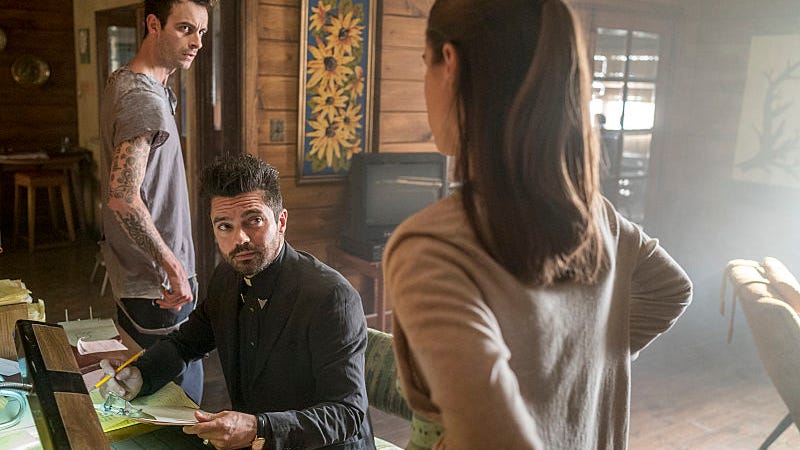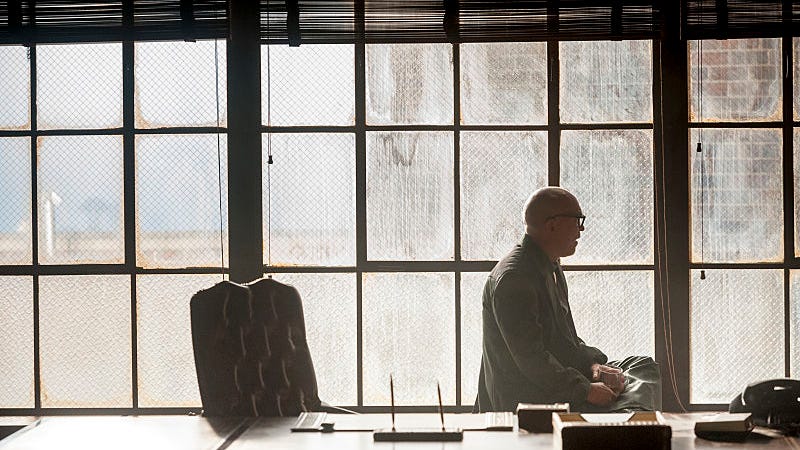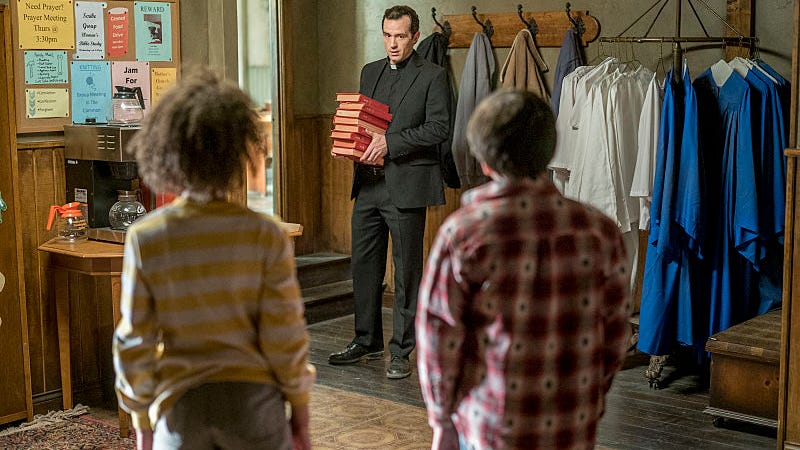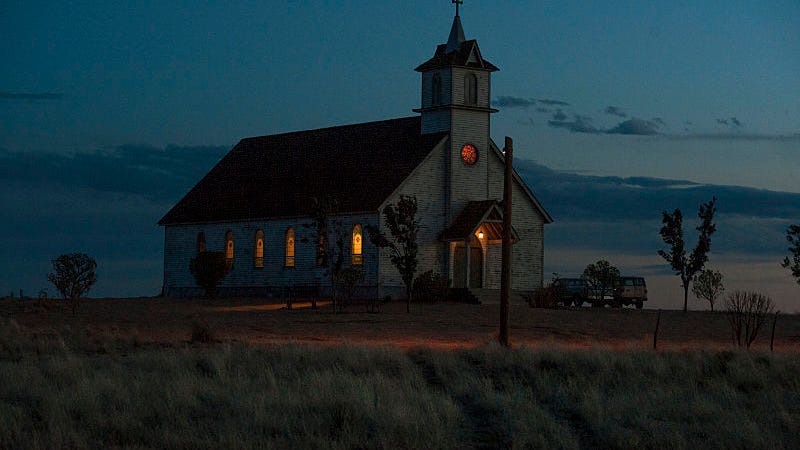Join or Sign In
Sign in to customize your TV listings
By joining TV Guide, you agree to our Terms of Use and acknowledge the data practices in our Privacy Policy.
Preacher Recap: Jesse's Friends Lose Faith
Jesse's secretive and unstable ways were at the center of everyone's problems
Most shows attempt to settle into a comfortable rhythm by the halfway point of their first season. That familiarity instills a sense of ease and confidence within the audience, feelings that potentially can be exploited later when a show might take a big risk or deconstruct its own patterns. But eschewing any sense of real comfort or rhythm seven episodes into a 10-episode season? That takes gumption on the part of Preacher's creative team -- and it's a strong indicator of the show's long-term prospects.

It's still early, but Preacher has a knack for zigging right when it seems like it's primed to zag. Last week's "Sundowner" kicked off that extraordinary action/comedy set piece in the motel and concluded with an unfortunate and dramatic order from Jesse to Eugene, sending the well-intentioned teenager, seemingly, to hell. Sunday's "He Gone" purposefully lacked any of the zeal or extreme violence of the previous episode; instead, it ratcheted up the tension and unease among the core characters, with Jesse's increasingly secretive and unstable ways at the center of everyone's problems.
Let's be honest: Jesse kind of sucks. At the beginning of the show, pre-Genesis, he was nothing short of a failure, drinking and fighting his way through one sparsely attended sermon after another. Since the supernatural force became part of him, Jesse has only gotten worse -- less self-pitying and more self-absorbed, still well-intentioned but blinded by sudden power and decades of guilt over his father's murder. After roughly 1.5 episodes of demonstrating the good Jesse can do with Genesis as his co-pilot, Preacher smartly returned to the bad, and a whole lot of it.

"He Gone" brought the problems with Jesse (Genesis or not) to the forefront, choosing to display him not just using his abilities irresponsibly, but also treating those closest to him exceptionally poorly. Sheriff Root immediately realized that something was off when Eugene didn't appear in service after supposedly meeting with Jesse, but the good preacher couldn't bring himself to say a word. When confronted about his rash words for Eugene by Cassidy, Jesse again refused to take much responsibility, or really even acknowledge what he did.
While Jesse spent the first half of the hour in a bit of a daze, avoiding the reality of what he did to Eugene, those closest to him started to feel boxed out by his odd behavior. As the only one with any knowledge of Genesis and Jesse's new skills, Cassidy tried to reason with his friend, to no avail. Meanwhile, Tulip and Emily's visible frustration with Jesse reached their respective apexes, with both unable to get a nugget of truth from the man they love.
These feelings -- disappointment, guilt, anger -- hung in the air like Texas humidity, and made doubly worse by the close quarters of the church setting. There was no big fight sequence involving a chainsaw or a comedy of errors with angelic bounty hunters. Just four people (well, three people and a vampire) having a series of progressively strained and accusatory conversations: Cassidy and Tulip mocking one another over who knows Jesse best, Emily marking her territory with Cassidy, and so on.

This tactic enabled Preacher to tell a strong, character-driven story about Jesse without exactly requiring him to spill his guts. Other characters talked about their feelings for him and accused him of being duplicitous or a bad Christian, but he mostly ignored them. Along the way, the show's most detailed flashbacks yet filled in some necessary information about Jesse's father -- namely that Jesse feels personally responsible for his dad's murder because he prayed for something bad to happen after Custer Senior had Tulip sent away from the church.
It was already pretty clear that Jesse's guilt brought him back to Annville in the first place, but "He Gone" solidified that truth while tossing in a few other substantial reasons for Jesse to wallow. For him, Genesis is a way to alleviate that guilt and ultimately fulfill his father's dying words about being on the right side of the battle between good and evil. But in trying to assuage that guilt as quickly as possible, Jesse has repeatedly dropped the ball -- manipulating people, alienating Emily and Tulip, and eliminating Eugene.
The wrinkle is that Jesse knows all this. He knows he's wrong. He just doesn't want to admit it, because that means that, even armed with a supernatural ability he can't help people effectively. And so he lashes out, screaming at Cassidy that Eugene deserved to go to hell for his attempted murder-suicide with Tracy some time ago, shaming Tulip for sticking around the church like a stray dog, and yet again neglecting the endlessly caring Emily. If you include Eugene's disappearance, Jesse lost the four people who care about him most in the span of a day. That's pretty good work, champ.

This series of unfortunate events wasn't, on the surface, as immaculately constructed as the showdown at the Sundower last week, but the results were even more devastating. Although Dominic Cooper has been great all season, this was probably his best -- and most rangey -- work as Jesse. Despite some bumpy spots in episodes three and four, Preacher did a solid job of building to the escalating blowouts between Jesse and his pals. That Jesse (re)gained and lost pretty much everything and it doesn't exactly feel rushed is a fine achievement for the show. Oh, and he's bound to lose more, given that Quincannon, seemingly no longer affected by the power of Genesis, is coming to collect the church land on the back of their verbal agreement from a few episodes ago.
Making this kind of sharp turn from episode to episode shouldn't be easy. In fact, some of the season's earlier episodes attempted to make similar maneuvers between scenes, to a far lower degree of success. However, as Preacher continues to improve, as does its control over the big swings in tone and approach. Why aren't more people talking about how good this show is again?
Preacher airs Sundays at 9/8c on AMC.